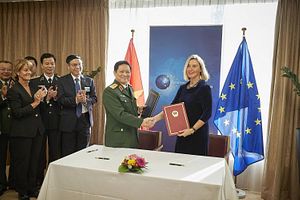Last week, the European Union and Vietnam officially signed a new defense-related agreement facilitating Vietnam’s involvement in crisis operations. The development highlighted the efforts by both sides to further strengthen the security aspect of their relationship despite the challenges that remain in doing so.
As I have noted before in these pages, over the past few years, as ties between Vietnam and the European Union as a bloc have gained greater traction, both sides have been looking to make inroads on the defense aspect of the relationship as well. With Vietnam continuing to strengthen ties with major powers and the EU eyeing a stronger security role in Asia, security ties have evolved to include not just collaboration on peacekeeping or naval visits but also inking new pacts to broaden cooperation and increase the formalization and institutionalization of the overall relationship.
One of the aspects within the defense realm of the relationship is framework participation agreement (FPA) which would facilitate greater Vietnamese involvement in crisis operations. Both sides have been looking to ink the FPA for several months now, and the signing was expected to occur soon following the conclusion of negotiations were reported to have taken place during the August visit to Vietnam of Federica Mogherini, the the High Representative of the EU for Foreign Affairs and Security Policy and Vice President of the European Commission.
Last week, as expected, both sides finally inked the participation framework. The agreement was signed on October 17 in Brussels by Mogherini and Vietnam’s Defense Minister Ngo Xuan Lich, as part of a wider trip that Lich made with a high-ranking military delegation to the EU from October 14 to October 19.
Strategically, for the EU, the agreement provides yet another concrete example of its increasing role as a security player in the region. The agreement gives the EU its first FPA partner in Southeast Asia and its fourth in the Asia-Pacific region (after Australia, New Zealand, and South Korea). For Vietnam, it reinforces Hanoi’s approach of strengthening ties with a range of major powers including the EU, despite challenges that EU-Vietnam ties continue to face on issues such as human rights.
Operationally, the agreement also does open the door to more concrete EU-Vietnam security cooperation in some areas. The FPA provides the legal basis to facilitate Vietnam’s participation in EU-led Common Security and Defense Policy (CSDP) civilian and military crisis management operations, which is a component of what has been previously characterized as a “defense and security cooperation partnership.” And while the shape of Vietnam’s participation is not yet clear – Mogherini indicated there was already interest by Vietnam in one of the EU’s training missions in Africa – both sides have been messaging the component as an important example of a shared commitment of a rules-based multilateral approach to international peace and security.
Of course, one should not overstate the significance of the FPA. It is just one part of the wider defense relationship, and it is still unclear how it will actually be implemented. And while this does constitute a gain for EU-Vietnam ties, it does not change the fact that there continue to be limits on how far both sides can push security collaboration due to a range of factors related to issues such as their capabilities and the differences in domestic systems.
Nonetheless, the signing of the FPA merits attention, both in terms of the EU-Vietnam relationship as well as the broader region. And this will remain the case as both sides look to further their defense ties for the rest of 2019 and into 2020 amid a range of other priorities, whether it be Vietnam’s busy year as it holds both an ASEAN chairmanship and the nonpermanent UN seat or broader flashpoints such as U.S.-China tensions that preoccupy officials in both Hanoi and Brussels.
































